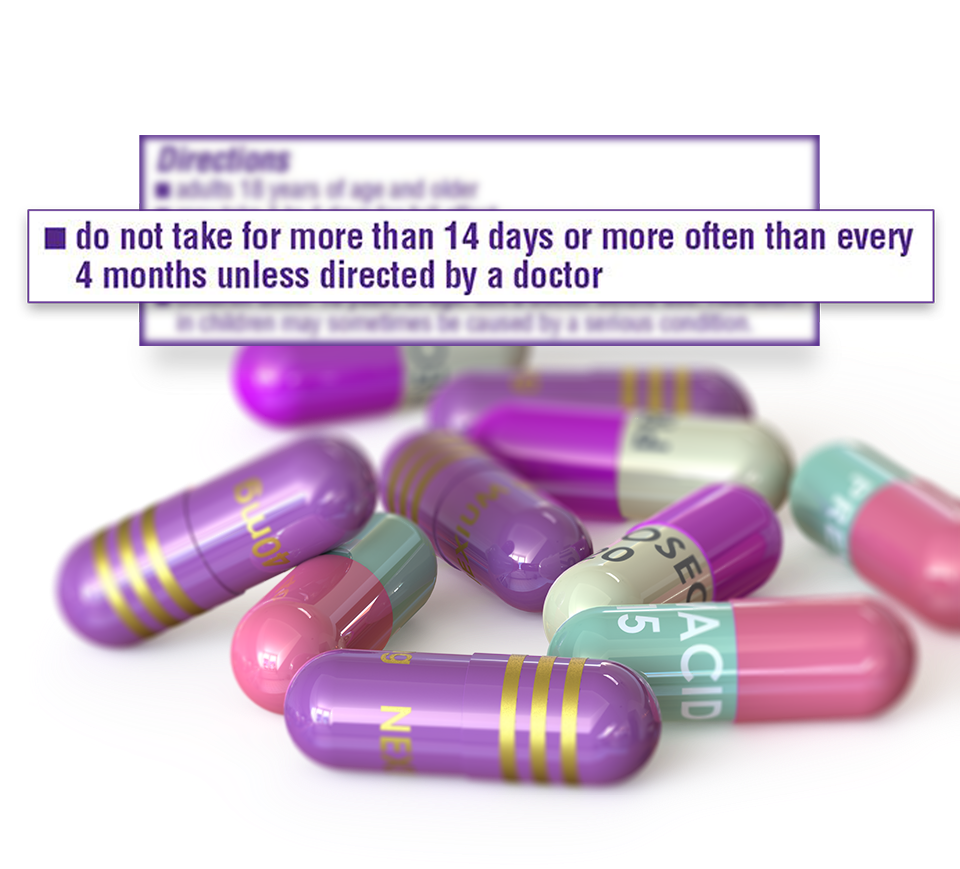
Approximately 15 million Americans have prescriptions filled for Proton Pump Inhibiting medications (Prilosec, Nexium, Prevacid) each year, and millions more take OTC anti-acids. They are the 3rd biggest selling category of drugs annually, tripling in use from 2000-2003.

Yet even though up to 40% of Americans may experience “heartburn” symptoms at least once a year…it is estimated 25-75% of those taking these medications do not need to do so on a ongoing basis. We need to fully understand the health risks associated with their use and decide if the benefits outweigh the risks.
First, let’s understand exactly what is happening in most cases of GERD. Most are under the assumption that they have too much stomach acid, when in fact it is almost always the exact opposite as we age. Like most bodily substances…hormones certainly come to mind…stomach acid production declines as we age. Yet Hydrochloric acid (HCL) is needed for breakdown of the foods, 30% of protein breakdown occurs directly in the stomach. This is where Vitamin B-12 gets liberated from the food it is closely bound to, so it is estimated 65% of long term users of PPI's are B-12 deficient. Moreover, stomach acid is a barrier that can prevent pathogenic bacteria and other unwanted microorganisms from getting further into our digestive tract
But it is not really the amount of acid in the stomach that causes the discomfort we call heartburn. Heartburn is caused when acid that is supposed to be in the stomach aiding digestion backs up into the esophagus. The lower esophageal sphincter (LES) valve allows food to pass into the stomach, but is supposed to prohibit stomach contents from going in the other direction. The valve is supposed to work as a PH sensor, so when there is food present in the stomach mixed with acid & Pepsin, the valve is supposed to sense this low PH and be shut tight. But in GERD, the valve has not closed completely, and the stomach acid flows up back into the esophagus, causing the pain and inflammation we call heartburn.

Our stomachs are lined with a thick, protective layer of mucus that separates the acids from the delicate lining of our stomach. The thickness of the mucus lining is dependent on the levels of HCL acid, the more acid the thicker the layer. So what happens when we take PPI's like Prilosec or Nexium? These medications turn off the acid production from the Parietal cells of our stomach, and very shortly, the mucus lining begins to thin out, as the acid levels have dropped so low, the stomach no longer needs to produce this protective layer. Even worse, we no longer digest any foods in our stomach due to the absence of acid, and food enters our small intestine undigested and the extra time needed to try and start breaking down what should have been predigested in the stomach...causes fermenting, gas and bloating. Pathogenic bacteria and yeasts pass right into our intestines because there was no stomach acid left to kill them before the reached our digestive track...this causes a rise in SIBO, small intestine bacterial overgrowth...

This is just the beginning of the health risks research has associated with PPI use.
In a new report by researchers at John's Hopkins University, people who use PPI's are at a 20-50% increased risk for developing chronic kidney disease
Acute Kidney failure patients were twice as likely to be users of PPI's
PPI's increase risk of bone fractures
People who use PPI's have a 1.58 fold greater risk of heart attack, possibly from PPI's creating Magnesium deficiency.
People age 75 and older who use PPI's have a 44% greater risk of developing dementia, including Alzheimer's.
Patients who used PPI's had 38% increased risk of Dementia, 44% increased risk of Alzheimer's.
So using PPI's increases your risk of Kidney disease and failure, bone fractures, heart attacks, Dementia, Alzheimer's, infections and pneumonia. All so you don't have heartburn.
Now you may say, uncontrolled GERD can lead to Barrett's Esophagus.
What if I told you the PPI's you take for Barrett's Esophagus increased your chance of it progressing to Esophageal cancer?
Comments
John Boyce:
Hi Kari,
It won’t help you make more stomach acid…but could very well help your digestion. If you need HCL…nothing really replaces that.
May 16, 2017
Kari:
Will this help with the production of stomach acid ? I have to take HCL when I eat or my food does not digest well. Lots of gas and bloating if I don’t take it.
Thank you for your help!
May 16, 2017
Leave a comment